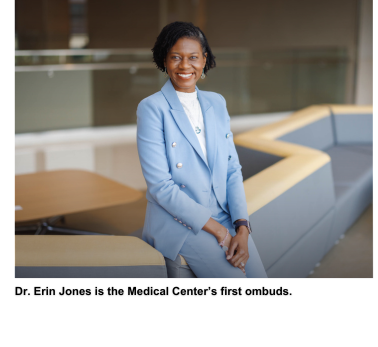Safe Space, Confidential Communication
Good morning.
Today, I want to talk about a new office created recently at the Medical Center. Many of you who took a survey some time ago suggested it – if not in name, at least in purpose: the Office of Ombuds.
Also called an ombudsperson, ombudswoman or ombudsman, the role is a safe space for working through conflicts that may come up involving employees, students, managers and so forth. It is different from other means of conflict resolution in several ways. First of all, it is off-the-record. It is private.
 The person we brought to the Medical Center to fill this role is Dr. Erin Vaughn Jones, who refers to her role as “Switzerland.” It’s a fitting comparison. In her dealings as an ombuds, Dr. Jones offers a neutral ear in matters involving relationships among colleagues and peers, career progression and transition, policy questions, bias, inequity and/or microaggressions and more.
The person we brought to the Medical Center to fill this role is Dr. Erin Vaughn Jones, who refers to her role as “Switzerland.” It’s a fitting comparison. In her dealings as an ombuds, Dr. Jones offers a neutral ear in matters involving relationships among colleagues and peers, career progression and transition, policy questions, bias, inequity and/or microaggressions and more.
Dr. Jones came to us last fall after seven years at Hinds Community College, most recently as dean of student services and Deputy Title IX Coordinator. She is a certified mediator and has a PhD in educational leadership, research and counseling. She is accustomed to stepping into uncomfortable situations, to say the least.
But why bring her in at this point?
A while ago, employees took a survey that included this question: “What would improve your well-being?” Many of you said you would like to have a more anonymous way to raise concerns without going through a manager or Human Resources, without resorting to a formal investigation. That certainly sounded like an ombuds was called for.
But we’re not alone in this, by any means. In my various roles with the Liaison Committee on Medical Education – an accrediting body for medical education programs – we had discussions about the benefits of an ombuds office. At many academic institutions, it is considered a best practice. It’s important to note that the Accreditation Council for Graduate Medical Education has its own ombuds office.
As far back as 1971, the Carnegie Commission on Higher Education recommended the creation of ombudsmen in U.S. universities as part of a course for the “protection of the rights and enforcement of the obligations of members of a campus.”
As I said in last week’s VC Notes, inevitably, there will be tensions in a world as complex and diverse as an academic medical center like ours. I believe we all try to do our best to smoothly work together toward a shared purpose, but I recognize that there are going to be clashes of personality, cultures and interests.
And when that happens, Dr. Jones’ office offers a way to reconcile these differences, and does so by following the standards of practice and a code of ethics set by the International Ombuds Association. Those include a guarantee of confidentiality. She cannot be subpoenaed to testify in court. Only when there is a looming risk of serious harm can confidentiality be broken.
She doesn’t determine who’s right or wrong. She can’t direct a faculty member to change a student’s grade. But she can find a way to respectfully approach and listen to each side in a dispute and work toward a resolution.
Dr. Jones, who reports to me and Dr. Brian Rutledge, assistant vice chancellor and chief of staff, works out of an office in the Verner Holmes Learning Resource Center. To make an appointment, you can reach her at ombuds@umc.edu or 4-1119. But I urge you to not use email or voicemail to share confidential information.
If Dr. Jones believes a more formal channel is needed, she will make referrals to, for instance, Human Resources, Faculty Affairs or Academic Affairs; or, for employees who may need support coping with a different situation, to the Office of Well-being or Employee Assistance Program.
As she has said, we need to offer an environment where people can be their “best selves.” We can be our best selves even when there are conflicts – healthy conflicts – because, by working together to solve them, we learn and we grow – and continue to go forward on our path toward A Healthier Mississippi.



